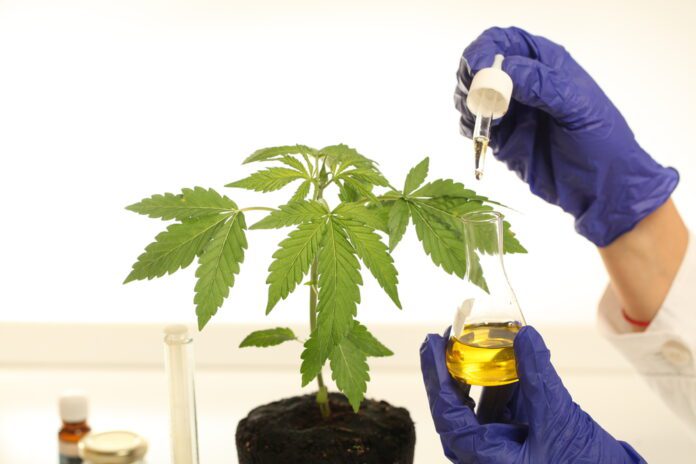Over the years, cannabis has gained more and more significance and popularity especially for its medical benefits. But what does CBD oil do in relation to cannabis? Does CBD oil have marijuana? Let’s find out!
What Is CBD Oil?
CBD stands for cannabidiol, a non psychoactive ingredient or chemical found in marijuana. According to medical expert Peter Grinspoon (MD), cannabidiol is one of the most important active components of cannabis which forms a major part of medical marijuana”.
CBD belongs to a class of compounds called cannabinoids which are natural constituents of the hemp plant. Without contest, CBD is the most sought after derivative of marijuana. It is so because it lacks addictive or mentally stimulating properties.
What this means is that you cannot get high on CBD and as such, it is safe for use in many practical situations. More so, very few side effects or adverse reactions have been reported with the use of this drug.Very many positive testimonies in the use of CBD by both health experts and ordinary consumers have made it a popular product in the health and lifestyle market.
The CBD industry is flourishing. Today, more than half of the states in the US have either legalized medical or recreational marijuana.
What Is The Historical Background Of CBD Oil?
One of the earliest recorded uses of cannabis goes as far as 2000 BC. An asian ruler, Sheng Nung, would often take tea made from cannabis to treat all kinds of health conditions including rheumatoid arthritis, memory and gout. Around the same time in Europe, hemp was grown for something entirely different – for fiber!
In Africa, the earliest documented use of cannabis traces back to the Mediterranean Coast and Madagascar, about a thousand years ago. Language geography suggests broad regions in which shared understandings of the plant developed, although there is insufficient information to characterize historical cannabis cultures for these putative regions.
Cannabis was legal in much of Africa under colonial rule until 1925 when it became subject to international control under the Geneva Opium convention. Cannabis plants were legal during the colonial period in America. It was introduced to America by the colonialists as it became a popular cash crop contributing immensely to the Gross Domestic Product (GDP) of places like Colorado, Virginia and Georgia. There was massive advocacy by activist groups in the 20th century against the use of psychoactive drugs which led to criminalization of most drugs. Between 1900 – 1931, cannabis was outlawed in 29 states. On October 1 1937, the Marijuana Tax Act was signed into law, making access to it very difficult. However researchers with interest in the study of cannabis, continued with their quest about the knowledge of the plant.
A breakthrough was recorded by Roger Adams in 1942 when he identified the cannabidiol compound embedded in the hemp plant. Six years after the discovery of cannabidiol, Dr. Walter Loew began testing CBD and THC (tetrahydrocannabinol) in mice and rabbits to observe the effects.
In 1964, an Israeli scientist, Raphael Mechoulam and his team separated the CBD compound from the rest and defined its structure and chemical composition.
What CBD Oil Is Not!
Though cannabidiol is considered as the younger child of the cannabis sativa plant, it has been found to be free of psychoactive properties and is safe for use.
THC the compound responsible for the psychoactive tendencies of cannabis is not contained in CBD oil. While the THC is the most famous of the properties of the cannabis plant for its ability to get its users high, experts say that CBD oil is medicinal and very effective without the questionable behavioral effects. The usual CBD formulation is oil.
Does CBD Oil Have Marijuana?
Yes, CBD oil is one of the chemical compounds found in marijuana, otherwise known as a cannabis plant. However, marijuana is usually misinterpreted as THC the compound responsible for psychoactivity or “highness” in cannabis.
What Are The Different Ways People Use CBD Oil?
CBD oil consumers use it in diverse kinds of ways from soaking it inside the tub, dropping a tincture under the tongue, whipping it into raw cocoa butter and creams, using it as a rub, to mixing it in drinking water. It appears that ways of administering CBD are only limited by one’s imagination.
What Are The Different Kinds Of CBD Oil?
Tom Brown, a cannabis researcher, said “with a rise in the popularity of CBD oil across the globe, the terminology used to describe products has become increasingly confusing. Companies have formulated several kinds of CBD oil and types of CBD products so as to stand out in the market.” There are two ways to categorise CBD oils according to Dutt, a biotechnologist:
1. By their list of ingredients or properties
2. By their method of usage
What are the kinds of CBD Oil By their Ingredients or properties?
We have the following categories of CBD oil, going by their makeups, ingredients or properties:
- Full-spectrum CBD oil
- CBD isolate
- Broad-spectrum CBD oil
How Can One Identify A Full-Spectrum CBD Oil?
This type of CBD oil contains a trace amount of THC, usually, less than 0.3%. They also include a combination of the following compounds:
- Protein
- Fatty acids
- Fiber
- Chlorophyll
- Terpenes
How Can One Identify The Isolate CBD kind?
This kind of CBD oil does not contain THC. It is the most suitable CBD for athletes due to anti doping rules. Also, isolate CBD does not have vitamins, minerals and cannabinoids.
What Are The Kinds Of CBD Oil By Methods Of Usage?
There are three popular kinds of CBD oil based on their methods of Usage. They are:
- Tincture mixture
- Massage CBD oil
- Oil based capsules
What Is Tincture Mixture Like?
It is usually made by soaking cannabis in alcohol and water.
Also, it is placed under the tongue to direct it into the bloodstream, especially for consumers seeking to induce sleep.
What Is Massage CBD Oil?
This is simply CBD oil used for body massage and enhancement.
What Are CBD Oil Based Capsules?
This is the CBD oil administered mostly orally for various health purposes
What Is Usually Confused With CBD Oil?
Hemp seed oil is the main product usually confused by people as CBD oil. However, it is starkly different from CBD.
What Are The Differences Between CBD Oil And Hempseed Oil?
- CBD oil is basically the infusing of cannabis in a carrier oil while it’s not the same process with hempseed
- CBD oil is made from the flower bud, stems and leaves of cannabis plant, whereas, hemp seed oil is made from hemp seed
- Hemp Seed oil doesn’t contain any CBD at all, however, CBD’s main base is cannabinoids
What Are The Appropriate Doses And Serving Sizes For CBD?
Whatever amount of CBD oil to be administered by an individual is advised to be under the guidance of a physician. Nonetheless, the appropriate serving sizes for CBD differ greatly depending on individual factors, such as:
- Intended use
- Body weight
- Body chemistry
- Metabolism
Does CBD Oil Have Any Side Effect?
CBD oil has side effects, however, most medical and health experts consider CBD oil effects as minor and possibly insignificant. However, pregnant and breastfeeding mothers are advised to seek and follow their doctor’s advice before consumption.
How Harmful Is CBD Oil?
The potential for harm resulting from CBD oil consumption stems from the following:
- Lack of evidence as to how safe it is, for consumption by pregnant and breastfeeding mothers
- Unreliability of the purity of its constituents
- Unreliability of the dosage of its constituents
What Are Some Possible Side Effects Of CBD Oil?
Possible side effects of the consumption of CBD oil include the following:
- Fatigue
- Digestive issues
- Drowsiness
- Sleepiness
- Dry mouth
- Diarrhea
- Reduced appetite
- Low blood pressure
- Fatigue
- 10.Interaction with other medication
What Is It For And What Are The Benefits Of CBD Oil?
In 2018, the Food and Drug Administration (FDA) approved a drug derived from cannabidiol to treat rare forms of childhood epilepsy. A cannabis market research firm Brightfold conducted a survey with a sample size of 5,000 people. More than 60% confirmed they used it for treatment of anxiety.
A resident medical doctor, Jillian Kubala alluded that, “Marijuana has been used to treat pain as far back as 2900 B.C.”. Scientific researchers have been able to isolate the compounds in marijuana and recently found that cannabidiol is one of such components responsible for its pain-relieving property. In fact, in Brazil, 57 men were used for a clinical research on CBD. Some were administered oral cannabidiol and others, a placebo almost 2 hours to a public speaking assignment. Those who received the 300mg those showed a marked decrease in anxiety as against participants who received 150mg and 600mg doses.
Other clinical studies have shown that CBD oil is also effective against post traumatic stress disorder (PTSD) and insomnia. Other benefits include the following:
- Cure of cancer related pains
- Anti-inflammatory effect on skin’s oil glands
- Anti-tumor effect
- Treatment of nausea from chemotherapy and neuropathic pain
- May reduce acne
- Used for addiction management
- Cure of insomnia
- Treatment of PTSD
- Regulate seizures
- Improve lung capacity
- Helps provide relief to individuals with multiple sclerosis.
Where Is CBD Oil Legal?
The legal stance in the non-medical use of cannabis in most countries is either yes or no but in a few countries, there are grey areas. For instance, the UK and France allow the sale of CBD oil and products only if it contains no THC (0%) while others allow it if the THC levels are less than 0.2%. In the United States, the federal law says CBD grown from hemp, containing less than 0.3% THC is legal for cultivation, transportation and sale.
However, since the states have the final say on this, it is important we highlight these states. They are: Alaska, California, Massachusetts, Michigan, Nevada, Oregon, Vermont, Washington and Washington DC. These states decriminalized cannabis related products for medicinal and recreational purposes.
According to The Extract‘s updated 2020 list, places where CBD oil is legal include the following:
- Bulgaria (first country in Europe to allow free sale of CBD oil products made from hemp. It is in fact, regarded as food by law)
- Austria (with prescription)
- Belgium (with prescription)
- Croatia (with prescription)
- Cyprus
- Czech
- Estonia
- Finland (with prescription)
- France (with 0% amount of THC)
- Germany (with prescription)
- Greece (with prescription)
- Hungary
- Republic of Ireland
- Italy
- Latvia
- Lithuania
- Luxembourg
- Malta (with prescription)
- Netherlands
- Norway
- Poland
- Portugal
- Romania
- Spain
- Slovenia
- Sweden
- Switzerland
- Ukraine
- United Kingdom (0% THC)
Also, in Australia and New Zealand, CBD is decriminalized and legalized but like most European countries, it must be less than 2% THC in content.
CBD is decriminalized and legalized in South Africa but illegal in much of Africa except for some countries like Zimbabwe and Lesotho which recently restricted it for medical purposes only.
References:








